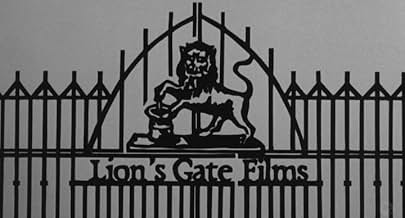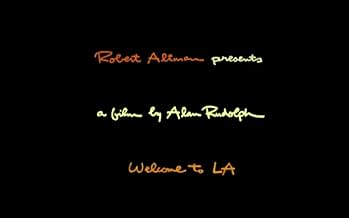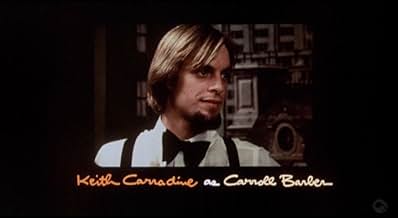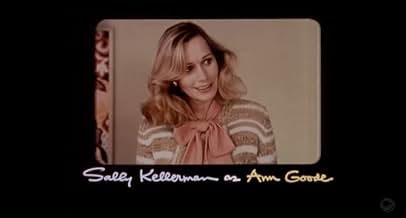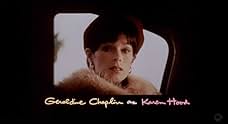NOTE IMDb
5,7/10
1,3 k
MA NOTE
Ajouter une intrigue dans votre langueThe lives and romantic entanglements of a group of young adults who have achieved "overnight" success in Los Angeles.The lives and romantic entanglements of a group of young adults who have achieved "overnight" success in Los Angeles.The lives and romantic entanglements of a group of young adults who have achieved "overnight" success in Los Angeles.
- Réalisation
- Scénario
- Casting principal
- Nomination aux 1 BAFTA Award
- 1 nomination au total
Mike Kaplan
- Russell Linden
- (as Mike E. Kaplan)
Ron Silver
- Massuese
- (non crédité)
Avis à la une
If you saw this film when it came out, the cultural atmosphere would have no nostalgic impact on you, even if you lived in L.A., because it was obviously present day for you.
Which brings us to the main thing that so many of us like about the movie. We like to take in the clothes, cars, landscapes and musical vibe of a bygone era; one which we may have lived for and now long for. For younger people, there may be a fascination for the way part of the world was before they were born.
I was there in L.A. at that time. As a very wide-eyed and impressionable teenybobber, I was standing in the background watching the grown ups and the older kids living out their 70s lifestyle. I was just a tad too young to join. My favorite line in the film is "Daydreams and Traffic," uttered by Keith Carradine, repeating what his blonde real estate agent said L.A. is all about. I totally agree with that vibe. It's addictive in an odd sort of way.
Character development is vitally important to a film, and this one is short on it. For me, at some point, a character has to explain why they are the way there are. Or at least it must come out in related dialogue. It didn't here for the most part.
I say "for the most part," because we do at least see through couplings and facial expressions, and monlogues, that they are lonely people who are not getting the love and devotion they had hoped for from their life partners and families.
Yes, these are mostly shallow,self-indulgent losers, who characterize the worst aspects of their era and area. But it's o.k. to tell a story about losers, if they are the types you are familiar with. Like another reviewer, I too give the makers credit for not including movie people. That would be too easy and too clichéd.
I loved the Richard Baskin music. His slightly off-key delivery made it better than it would be if it were perfect. Songwriters are not necessarily supposed to be great singers. They sing their own stuff with true feeling however, since they know the ethos behind the music better than anyone else. Of course in this movie, maybe the Keith Carradine character was supposed to have written the music.
The nudity did nothing for me. The context was not sexy. I'm not a big fan of big boobs on a super skinny body. I like proportion.
Even though I am a conservative person, I do often wish I could have lived as an adult during a period when everyone was open to one night stands. I love the idea of bonding with a waitress and enjoying an evening together with no strings. I know that makes me a bit of a hypocrite.
I guess I envied the Carradine character's unearned millions, his cool house, his talent, and his ability to bed whomever he chose, whenever he chose. Enough said.
Which brings us to the main thing that so many of us like about the movie. We like to take in the clothes, cars, landscapes and musical vibe of a bygone era; one which we may have lived for and now long for. For younger people, there may be a fascination for the way part of the world was before they were born.
I was there in L.A. at that time. As a very wide-eyed and impressionable teenybobber, I was standing in the background watching the grown ups and the older kids living out their 70s lifestyle. I was just a tad too young to join. My favorite line in the film is "Daydreams and Traffic," uttered by Keith Carradine, repeating what his blonde real estate agent said L.A. is all about. I totally agree with that vibe. It's addictive in an odd sort of way.
Character development is vitally important to a film, and this one is short on it. For me, at some point, a character has to explain why they are the way there are. Or at least it must come out in related dialogue. It didn't here for the most part.
I say "for the most part," because we do at least see through couplings and facial expressions, and monlogues, that they are lonely people who are not getting the love and devotion they had hoped for from their life partners and families.
Yes, these are mostly shallow,self-indulgent losers, who characterize the worst aspects of their era and area. But it's o.k. to tell a story about losers, if they are the types you are familiar with. Like another reviewer, I too give the makers credit for not including movie people. That would be too easy and too clichéd.
I loved the Richard Baskin music. His slightly off-key delivery made it better than it would be if it were perfect. Songwriters are not necessarily supposed to be great singers. They sing their own stuff with true feeling however, since they know the ethos behind the music better than anyone else. Of course in this movie, maybe the Keith Carradine character was supposed to have written the music.
The nudity did nothing for me. The context was not sexy. I'm not a big fan of big boobs on a super skinny body. I like proportion.
Even though I am a conservative person, I do often wish I could have lived as an adult during a period when everyone was open to one night stands. I love the idea of bonding with a waitress and enjoying an evening together with no strings. I know that makes me a bit of a hypocrite.
I guess I envied the Carradine character's unearned millions, his cool house, his talent, and his ability to bed whomever he chose, whenever he chose. Enough said.
The minute the singer uttered "City of one night stands", I should have stopped watching this but I soldiered on. I was hoping for a storyline with Laurel Canyon scene in it since it was a "musical" of that period and about LA. Nope. Welcome To LA has a great cast that is totally wasted. I'm pretty sure the cast completely trusted Alan Rudolph on this mess and signed their respective contracts and have to suck it up.
Sissy Spacek, Sally Kellerman and Geraldine Chaplin were were good all things considered. Is the whole movie a flashback? I waited and waited for a narrative but the writer hid it with the Easter eggs. Scenes like a minute of Geraldine walking on an alley emoting, then cut to an unrelated scene. Cut and paste is a bad way. Rudolph trying to be a 1970s Alain Resnais, he is not by a long shot.
Being an Angeleno who loves movies about LA, I say avoid this movie at all costs.
Ps I looked up the singer Richard Baskin on Discogs and I am happy to tell everyone that his contribution to the soundtrack was the last of his recording career.
Sissy Spacek, Sally Kellerman and Geraldine Chaplin were were good all things considered. Is the whole movie a flashback? I waited and waited for a narrative but the writer hid it with the Easter eggs. Scenes like a minute of Geraldine walking on an alley emoting, then cut to an unrelated scene. Cut and paste is a bad way. Rudolph trying to be a 1970s Alain Resnais, he is not by a long shot.
Being an Angeleno who loves movies about LA, I say avoid this movie at all costs.
Ps I looked up the singer Richard Baskin on Discogs and I am happy to tell everyone that his contribution to the soundtrack was the last of his recording career.
You can't help but compare it to the other big L.A. Statement Movies--Altman's SHORT CUTS, and P.T. Anderson's MAGNOLIA. I like Rudolph's way better than either of those: it's gentler, humbler, more observant, truer. Limiting himself to a dozen or so L.A. habitues, Rudolph starts with one funny, correct move: no movie people. The dances of disconnection, attempted connection, failed connection, and--stunning!--connection accomplished are as tender and as finely, thinly observed as Rudolph has ever pulled off. So many beautiful moments here: the best comes when Keith Carradine, as a dupe of his sleepy-stud character from NASHVILLE, breaks up a romance to go on a healing mission with a half-crazy housewife (Geraldine Chaplin). When his philandering with her rescues her marriage during a tense phone call in his apartment, Carradine's face spreads with gladness and relief. The rightness and the unexpectedness of the moment is fantastic. Even more than the goofy, enjoyably romantic CHOOSE ME, this is the one where Rudolph got it all right. And no other movie captures L.A.'s peculiar loneliness like this one: he doesn't hype anything or play to the tourist mentality--something that could not always be said for his mentor, and the movie's producer, Robert Altman.
"Welcome To LA" is a dated film involving ten characters whose only shared trait seems to be loneliness. The movie plays like a moody tone poem, and there are no comedic, dramatic, or action-filled sequences... just a bunch of urban sun-bums looking lost and hopelessly mellow.
Keith Carradine redefines the term "slacker" for the Me Generation, as he wanders around LA with a soul patch having intercourse with a score of women while never once changing his expression. He's supposedly an artist, with troubles in his romantic life and familial relationships, but he is so centered, so serene, so placid, that he comes off more as a Buddhist monk or Jedi Knight.
He has occasional flashbacks to his former lover played by Diahnne Abbott, and I have to believe that no man would ever forget this woman. In her wordless seconds of screen time here, just like her tiny roles in "Taxi Driver" and "New York, New York," you can see that this is one of the most gorgeous, sexual women ever to walk the Earth... she's got the jungle in her, and this is the type of woman men kill other men to be with. She was my favorite part of the movie.
Between stories involving the grating Geraldine Chaplin and the sexy Sally Kellerman we keep cutting back to Richard Baskin as a singer/songwriter recording his album in a studio. These songs and the montages cut around them- which were presumably meant to be the heart of the film- are rendered unlistenable by the foul, nails-on-blackboard voice of Baskin. The fact that this man was ever allowed behind a microphone is a crime against the eardrum. Instead of the soulful, contemplative center of the story, we get a talentless drone warbling clichéd lyrics while the leads bemoan their fate. Nothing makes the heart ache like sunshine.
The only other bright spot is Sissy Spacek, a woman of unbelievable beauty and depth, who effortlessly steals the show whenever she's on screen. Ms. Spacek can be a naive little girl one minute, an intellectual adult the next, and a lusty sexpot only seconds later. If you love her like I do check out "Violets Are Blue" in which she plays a woman so irresistible you cannot help but fall in love.
"Welcome To LA" is supposed to show the isolation and loneliness that exists even in the hedonistic, superficial world of La-La Land... the trouble is we wind up with a movie that confirms our worst beliefs about the place: These characters have no right to be this bummed... it's shallow, narcissistic self-pity. But it makes for a great late-night movie.
Grade: C
Keith Carradine redefines the term "slacker" for the Me Generation, as he wanders around LA with a soul patch having intercourse with a score of women while never once changing his expression. He's supposedly an artist, with troubles in his romantic life and familial relationships, but he is so centered, so serene, so placid, that he comes off more as a Buddhist monk or Jedi Knight.
He has occasional flashbacks to his former lover played by Diahnne Abbott, and I have to believe that no man would ever forget this woman. In her wordless seconds of screen time here, just like her tiny roles in "Taxi Driver" and "New York, New York," you can see that this is one of the most gorgeous, sexual women ever to walk the Earth... she's got the jungle in her, and this is the type of woman men kill other men to be with. She was my favorite part of the movie.
Between stories involving the grating Geraldine Chaplin and the sexy Sally Kellerman we keep cutting back to Richard Baskin as a singer/songwriter recording his album in a studio. These songs and the montages cut around them- which were presumably meant to be the heart of the film- are rendered unlistenable by the foul, nails-on-blackboard voice of Baskin. The fact that this man was ever allowed behind a microphone is a crime against the eardrum. Instead of the soulful, contemplative center of the story, we get a talentless drone warbling clichéd lyrics while the leads bemoan their fate. Nothing makes the heart ache like sunshine.
The only other bright spot is Sissy Spacek, a woman of unbelievable beauty and depth, who effortlessly steals the show whenever she's on screen. Ms. Spacek can be a naive little girl one minute, an intellectual adult the next, and a lusty sexpot only seconds later. If you love her like I do check out "Violets Are Blue" in which she plays a woman so irresistible you cannot help but fall in love.
"Welcome To LA" is supposed to show the isolation and loneliness that exists even in the hedonistic, superficial world of La-La Land... the trouble is we wind up with a movie that confirms our worst beliefs about the place: These characters have no right to be this bummed... it's shallow, narcissistic self-pity. But it makes for a great late-night movie.
Grade: C
When Karen Hood (Geraldine Chaplin) tells Carroll Barber (Keith Carradine) "I love Greta Garbo," he responds with the slightly cryptic "Yeah, she's nice when you're by yourself."
Profound, but too offhand to be a predictable rejoinder. It's very striking, one of the most original of the film.
Especially do you get the flavour of the upper-middle-class world-weary young disappointed in Baskin's lyric:
"At first I loved your sweet complexion, your tawny cheeks and lip confections--they photographed you for your style.
your body held me for a while; you could disguise with such beguile
now lying her remembering it better than it used to be is loneliness, but it doesn't really matter now, I never really loved you much, I guess."
That's from the title song.
From "The Best Temptation of all" there is "there's so many bodies and scenes...so many faces and feelings...dreams...wet tasting dreams
when those silky infatuations come, enticin' me...invitin' me..excitin' me.."
The world of "bodies and pleasures" that was Michel Foucault's vision of the future of sexuality in the first volume of THE HISTORY OF SEXUALITY was being lived out in L.A. in particular before he even wrote that it would come to this.
At a Malibu party where Carroll and his wealthy father Carl (marvelously played by Denver Pyle) confront each other, Carl's mistress Nona (Lauren Hutton) spends some stylized, posturing time with Carroll up the stairs overlooking the stylized party, the kind of party in stark white stylized modern LA houses where being comfortable must be impossible, and being controlled is an impossible necessity; and he says to her "Do you really care about that old man?" She says, knowing it won't do to say anything "less," "He sure seems to care a lot about me."
Earlier, before Carroll sees Susan (Viveca Lindfors) for the first time since his return, she says on the telephone "don't you want to see me?" and he says "I've seen you." As the older woman, somewhat desperately clinging to an unshared wish, she says "I've seen you too. I liked it."
To the love-and/or sex-starved real estate salesgirl Anne Goode (Sally Kellerman), Susan says, when she makes the arrangements for Carroll's apartment, "I pictured you plump and tiny with curly black hair--AGGRESSIVE. And here you are--soft and blonde and pretty." Anne, always trying to hard to please: "And here you are so beautiful."
Kellerman drives Carradine to his new Silverlake digs.
She says "this is Hollywood. I just love it. I don't know a thing about it, but I love it...(long pause)....does that sound like a line?...I didn't mean it to..I guess everything sounds like a line these days...Shameless, aren't I?...what are you thinking?....
Carradine: "About your shame."
************************************************************************
"People deceive themselves here, don't you think? Yes. And that's how they fall in love. And then, when everything is over, it's the other person that gets deceived. Am I right? Yeah. Van Nuys Boulevard...(long pause)..I don't need to be loved by anyone...I don't mind waiting...it's how you wait that's important, anyway..I think.. but everyone gets deceived...don't they..."
These are the opening lines of the film, which Chaplin intones in a cab going through L.A., riding all over it as she does every day, all dressed up in fur and pearl earrings and hat all for herself's own formality in the anonymity of a taxi ride.
I knew a number of people like this in 1976 and 1977. They were over-sophisticated and living in the strange limbo between the volatile, but vital 60's and the beginning of the carnage and sterization that began to open its fully tarnished flower with the Reagan era and has escalated to the deafening roar we have only 24 years later.
Bars were full of people who weren't on cellphones all the time.
They weren't ever on cell phones--even the ones you can still see.
Profound, but too offhand to be a predictable rejoinder. It's very striking, one of the most original of the film.
Especially do you get the flavour of the upper-middle-class world-weary young disappointed in Baskin's lyric:
"At first I loved your sweet complexion, your tawny cheeks and lip confections--they photographed you for your style.
your body held me for a while; you could disguise with such beguile
now lying her remembering it better than it used to be is loneliness, but it doesn't really matter now, I never really loved you much, I guess."
That's from the title song.
From "The Best Temptation of all" there is "there's so many bodies and scenes...so many faces and feelings...dreams...wet tasting dreams
when those silky infatuations come, enticin' me...invitin' me..excitin' me.."
The world of "bodies and pleasures" that was Michel Foucault's vision of the future of sexuality in the first volume of THE HISTORY OF SEXUALITY was being lived out in L.A. in particular before he even wrote that it would come to this.
At a Malibu party where Carroll and his wealthy father Carl (marvelously played by Denver Pyle) confront each other, Carl's mistress Nona (Lauren Hutton) spends some stylized, posturing time with Carroll up the stairs overlooking the stylized party, the kind of party in stark white stylized modern LA houses where being comfortable must be impossible, and being controlled is an impossible necessity; and he says to her "Do you really care about that old man?" She says, knowing it won't do to say anything "less," "He sure seems to care a lot about me."
Earlier, before Carroll sees Susan (Viveca Lindfors) for the first time since his return, she says on the telephone "don't you want to see me?" and he says "I've seen you." As the older woman, somewhat desperately clinging to an unshared wish, she says "I've seen you too. I liked it."
To the love-and/or sex-starved real estate salesgirl Anne Goode (Sally Kellerman), Susan says, when she makes the arrangements for Carroll's apartment, "I pictured you plump and tiny with curly black hair--AGGRESSIVE. And here you are--soft and blonde and pretty." Anne, always trying to hard to please: "And here you are so beautiful."
Kellerman drives Carradine to his new Silverlake digs.
She says "this is Hollywood. I just love it. I don't know a thing about it, but I love it...(long pause)....does that sound like a line?...I didn't mean it to..I guess everything sounds like a line these days...Shameless, aren't I?...what are you thinking?....
Carradine: "About your shame."
************************************************************************
"People deceive themselves here, don't you think? Yes. And that's how they fall in love. And then, when everything is over, it's the other person that gets deceived. Am I right? Yeah. Van Nuys Boulevard...(long pause)..I don't need to be loved by anyone...I don't mind waiting...it's how you wait that's important, anyway..I think.. but everyone gets deceived...don't they..."
These are the opening lines of the film, which Chaplin intones in a cab going through L.A., riding all over it as she does every day, all dressed up in fur and pearl earrings and hat all for herself's own formality in the anonymity of a taxi ride.
I knew a number of people like this in 1976 and 1977. They were over-sophisticated and living in the strange limbo between the volatile, but vital 60's and the beginning of the carnage and sterization that began to open its fully tarnished flower with the Reagan era and has escalated to the deafening roar we have only 24 years later.
Bars were full of people who weren't on cellphones all the time.
They weren't ever on cell phones--even the ones you can still see.
Le saviez-vous
- AnecdotesGeraldine Chaplin's first nude scene. "My nudity, which is total, has nothing erotic about it: it is part of the anguish of my character," she said.
- Crédits fousIn the opening credits, the actors are credited with an accompanying still picture and their character name.
- ConnexionsFeatured in Z Channel, une magnifique obsession (2004)
Meilleurs choix
Connectez-vous pour évaluer et suivre la liste de favoris afin de recevoir des recommandations personnalisées
- How long is Welcome to L.A.?Alimenté par Alexa
Détails
Box-office
- Budget
- 1 100 000 $US (estimé)
Contribuer à cette page
Suggérer une modification ou ajouter du contenu manquant


